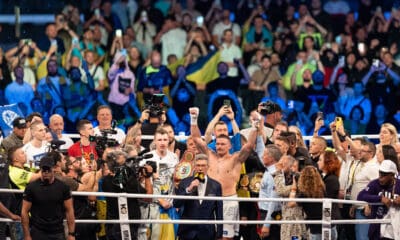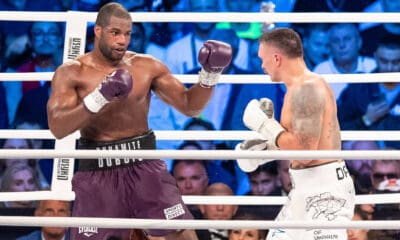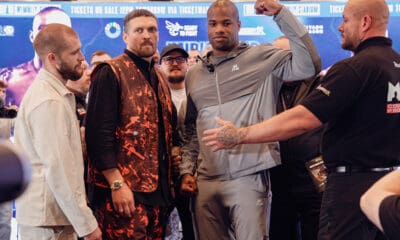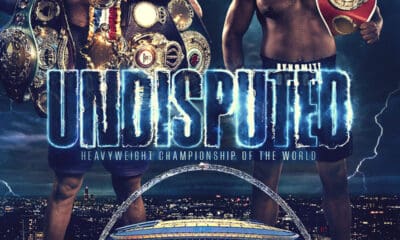For my generation, there wasn’t a real conversation about the best when I was growing up. Not when it came to boxing. Mike Tyson was God.
Or at least the closest thing to being created in his own image when he stepped inside the ropes.
When I was 8, the most popular game to play at my friend Kyle’s house was Mike Tyson’s Punch Out.
The premise of the game was pretty simplistic in nature somewhat similar to boxing itself at the time. The player would assume the role of “Little Mac” who faces a variety of different opponents from around the world until he had the “DREAM BOUT” vs. Iron Mike.
We would play for days on end, swapping the controller back and forth, along with the pizza slices. Once you guided Mac through all the opponents that stood in your way, you were destined to fight for the title. By the time you got there, seemingly as in real life, it only takes a couple of punches from Tyson to end your night if Macs skills weren’t honed during the journey through the ranks.
There wasn’t much to it in your youth. I knew Tyson was the best because he beat everyone he faced, laying waste to the division. Too young to understand the depth at heavyweight. Too immature to know about contracts or who that guy with the big hair and gold chains behind Tyson was. I wasn’t even allowed to stay up late and watch the foul-mouthed fighter. I just knew that the next morning my dad would confirm the details. No, when you’re young, you just knew who the best was because he beat all on-comers. And before the 90s gave us Jordan and Gretzky and Montana, there was one title that meant you were the best of all. The Heavyweight Champion of the World.
For the most part, each generation before knew who the best was, because he had to beat the best. The belts and bodies not dividing the championships into as many fragmented pieces. And when the Champ needed to face someone, it was the next contender in line that had made his way to #1. Contract negotiations were still being held, the promoters and distributors still lining their pockets. But in a more simplistic time, we didn’t worry about such things. He who wears the belts beat the best. Lather, Rinse, Repeat.
After Buster Douglas left Japan, the crown that was once worn by the elite and few began to change heads as if in a gloved and trunked version of Game of Thrones. Beginning as a teenager and through my 20s, I began to understand a little bit more about boxing as a business, and less about who was truly the best. Sure, Tyson was still around but he was never the same. Everything became divided. Multiple belts stating their claim. Promoters refusing to risk their champions against the others. More Pay Per Views for guys I didn’t know. All the while the heavyweight championship becoming less and less of a definition of great – more and more leaving a question mark of who was even good.
Fast forward and we find ourselves in the same predicament with only more layers of problems. The Heavyweight Champion of the World is….?
Tyson Fury? Deontay Wilder? Anthony Joshua?
And who is behind them? ESPN? DAZN? PBC?
This is not an issue isolated to the big guys. Every division has multiple champions now with difficulties making the big fights. But our sport has long found its definition at the top even if that isn’t rightfully so. If the casual boxing fan does not know who the best is at the top, they tend not to look down from there.
Long past the time where you could ask anyone on the street who the heavyweight champion is. The answers being dwindled down to the reality that most stopped watching, because they didn’t know who to watch. And on your favorite video game consoles? Only memories of Little Mac. Our youth only know of Ali and Tyson from stories and movies. Otherwise, there is a growing divide between the perception of what the Champion of the World used to mean, and the reality of what it is now. There is an argument to be made that Buster Douglas laid the most powerful punches in heavyweight history.
It stands to reason why there is so much excitement surrounding Oleksandr Usyk. The list of his achievements and accolades require their own edition. The Russian cruiserweight champion does not hold that title by happenstance. His systematic rise to Ring Magazine fighter of the year came at the expense of the 3 fighters who held the 4 belts in the division. Now, the reigning, undisputed champion who holds all the belts, sets his sights on the crown of all crowns. Like something out of a video game.
The path he is about to take is ambitious but not alien. Evander Holyfield, who is well known now as a Heavyweight Champion was arguably the greatest cruiserweight of all, his talents demanding him to go after the loftiest of goals just as Floyd Patterson had done decades before him. As for the physical capability of moving up? Holyfield stood at 6’2 and a trim sub 220 for much of his early career. Usyk at 6’3 and had a personal goal laid out to come at 220 for his first bout. Evander having an 18-0 record before his first Heavyweight tilt against James Tillis. Usyk sitting at 16-0 before his first foray into the class.
It’s hard not to put the cart before the horse with Usyk. The fans desiring a change in storyline with the stagnation that comes in the most consequential division. His tactical skills, strength and personality has won over many a loyal boxing fan. His goal, the common desire in the hearts of those who want to see boxing regain its place in sports heirarchy. Heavy weighs the crown and long is the road. Which starts with Carlos Takam, a veteran who has fought, and lost, to the likes of Chisora, Povetkin, Parker and Joshua. Some of whom Usyk will ultimately face himself. While Takam is not an elite talent, he is no Glass Joe. With a victory, WBO rules would make him a mandatory against Anthony Joshua in a potential super fight that could easily be placed at Wembley Stadium. But again with the cart and the horse.
Usyk is not looking to reinvent the wheel despite the change in class. His sparring partner, Fabio Wardley, has noted that while Usyk has filled out, he is not looking to put on imposing amounts of excessive weight. After all, the American Champion Deontay Wilder is regularly weighing under 220 pounds himself with taller stature. For Usyk, the focus more on his stamina and technical skills, which would serve as much an ally as the stellar jab that he has used to dictate pace. The same toolbox that reconstructed the Cruiserweights will be relied upon to put the screws to anyone standing in the way of his story.
On May 25thin Maryland, Oleksandr Usyk will embark on a journey that few have followed and fewer still have completed. One that could require him to replicate his success that he found at cruiserweight. A journey that could lead to a result that the fan base is rabid for. That the sport so desperately needs. That brings about memories of a time where we knew who the champion was, because he beat the best so he had the belt. To become the Undisputed Heavyweight Champion of the World.
To say it will happen, an error. To say it could happen still, far-fetched. So many obstacles in and outside of the ring. But for many at least a chance. A hope that finally someone has come with the intent to take on all comers. To mute the voices of promoters and networks hold on the division. To unify and to reposition the Heavyweight Championship of the World back to its rightful place atop the mountain of athletic achievements. The refurbishing of the crown. The return of the Mac.























